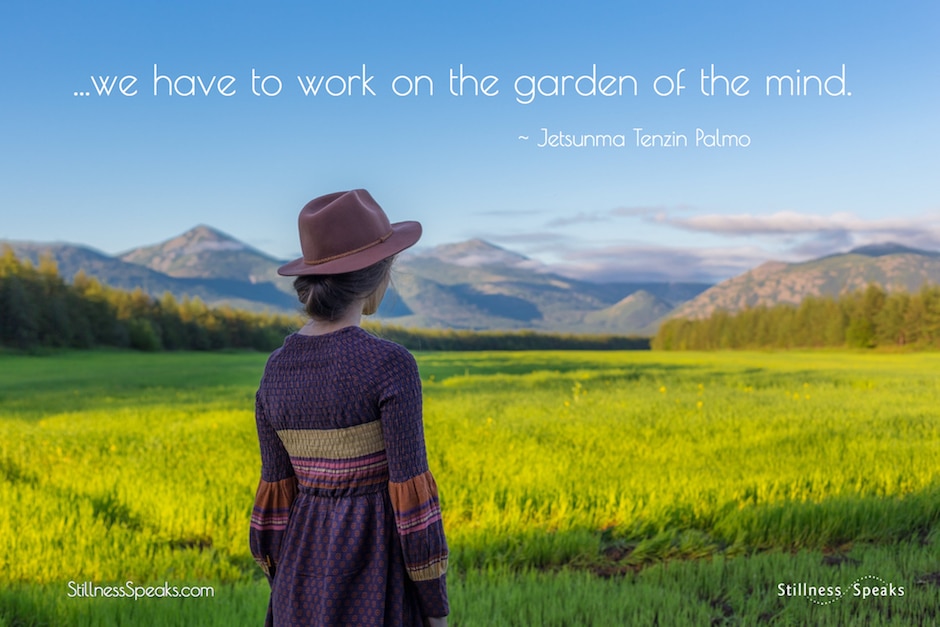…we have to work on the garden of the mind. ~ Jetsunma Tenzin Palmo
Seven Buddhist teachers from around the world answered questions about the challenges Buddhism faces as it moves into the West. This fourth post in our series explores western cultural emphasis on short term gratification, and asks, is it a problem for Buddhism? The intention of the writer of this book is to support the transition of Buddhism into the West so that its extraordinary beauty and wisdom may be accessible to more people. The seven teachers selected for this project represent the Therevadan, Zen and Tibetan traditions.
The questions and answers were compiled into a short book, 7 Questions for 7 Teachers which is available as a free PDF download. The teachers’ responses are being summarized over several weeks. We hope this series entices you to read the entire book. Questions and teacher responses are italicized.
The fourth question….
In the West particularly, there seems to be an emphasis on short-term gratification. Yet fundamental transformation with Buddhist methods seems inevitably slow. How can we work constructively with this situation? Do you think the current Western emphasis on short-term gratification is a problem?
Dzongsar Khyentse Rinpoche – Bhutanese-born Tibetan Buddhist master, author and filmmaker involved in preserving Buddhist teachings internationally… his response is short and sweet!
There are several things that you need to learn. One is that time is relative and therefore ‘slow’ and ‘fast’ are relative. Another is that you must learn patience. That’s it.
Jack Kornfield – American teacher of Therevadan Buddhism, international author, and pioneer of meditation and Buddhism into America
To answer all of the questions in this project, Jack submitted an edited but lenghty chapter from his book Bringing Home the Dharma. Download the free pdf of 7 Questions for 7 Teachers to read Jack’s responses to this and all the questions asked by author.
Roshi Joan Halifax – American Zen Buddhist teacher, hospice caregiver, environmentalist and engaged Buddhist
Roshi Joan isn’t convinced that the transformative processes are slow and gradual…we see change more quickly than we often even recognize. In terms of the development of wisdom, awakening, the deep aspects of compassion, I often compare it to oral hygiene… a daily practice to keep your own mental capacities tuned at a level of attention and prosociality. And that’s an ongoing process.
Roshi Joan is concerned about the world-wide information explosion…In our global culture I think we’re seeing a kind of information addiction that has pervaded the lives of many people.
This addiction concerns Roshi Joan. She sees it happening all over the world including indigenous cultures, such as Himalayan communities — Tibetan Buddhists in India log into the internet to connect with her home Zen Center, Upaya. What are the consequences? Clearly we don’t know how the internet explosion will settle.
Ringu Tulku Rinpoche – Tibetan-born Buddhist master, non-sectarian, a scholar and author
Ringu Tulki says that everyone wants quick results. Most people, however, who value doing something big and important, will do the hard and long-term work required…
People who want to achieve something big work very hard to achieve that, even in the West. They don’t NOT do that because it’s hard now – they go for it.
His response also revolves around how one views eternity. Do you believe that this is your only life, your only chance …? Or, do you take the long view, and believe that you will live many lives in which transformation occurs?
For those who believe in life after death…. it’s useful to be reminded that you don’t have to do everything in this life. If everything you want doesn’t happen, it’s alright, as we will have another chance in the next life, or next, and so on. But if you don’t have that view and think this is the only life you have, then you may come to feel quite frustrated.
For others, meditation practice is calming and rewarding.…if they meditate and learn some techniques to bring more peace and more joy to their mind, there can be less stress and greater happiness.
Rob Nairn – Zimbabwean-born teacher of meditation and Buddhism, author, and a pioneer of the adaptation of Buddhism for Westerners
Rob believes that advertising has created the desire to have things immediately. He extends this to “fixing” — we want something fixed right away. Allopathic medicine, for example, goes for the fast fix unlike indigenous healing methods which allow the body to slowly heal itself. To change this mindset, Rob works with process rather than sudden change.
We have this belief that things should change as soon as we do some thing. And our minds are locked into that. Now quite clearly this doesn’t work in terms of our dharma practice, and I would say its one of the biggest problems facing us.
The way I’ve started to work with it… introducing people to their own experience in such a way that they can see that what’s involved is not sudden change but process. So we start looking at ourselves not as entities that can change at the flick of a switch, but as a manifestation of a process.
Stephen Batchelor – British ex-Buddhist monk, author, scholar and leading secular Buddhist advocate
Stephen thinks that short-term gratification is far from being uniquely western; it’s the human condition. For Buddhism to be effective, it has to find ways to address both short and long-term needs.
Many who are drawn to Buddhism are seeking a way of life that provides a heightened sense of well-being in the here and now as well as a framework for cultivating virtues and insights that lead to fulfillment over the course of their entire life, and culminate in a positive legacy for those who will remember them after their death.
Jetsunma Tenzin Palmo – British born Tibetan Buddhist nun, ex mountain cave hermit, author and founder of nunnery for young women
Jetsunma’s poetic response needs no summary…
It is like growing a tree – after preparing the ground and planting the seed it takes time and application for this seed to transform into a sapling and eventually grow into a tall tree. Likewise we have to work on the garden of the mind – pulling out the weeds of mental defilements and digging down to loosen the heavy soil of our habitual tendencies. Then planting and encouraging the growth of healthy plants such as compassion, kindness and wisdom.
Stay Tuned....The next question and responses… How can Buddhism link to other spiritual systems? … are coming soon.









